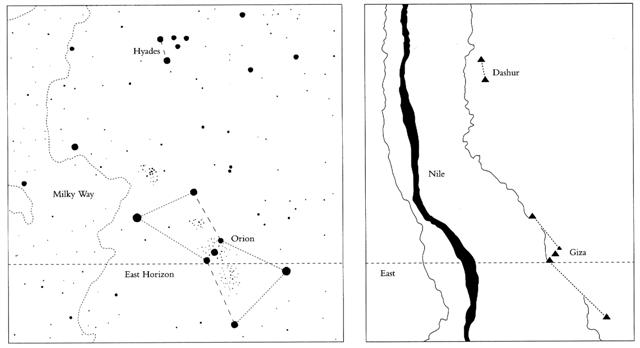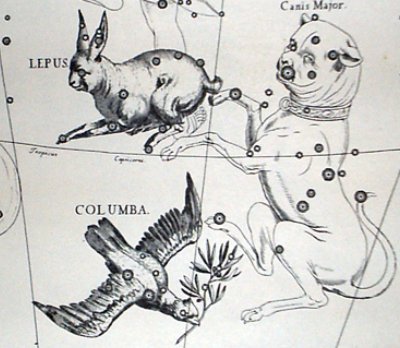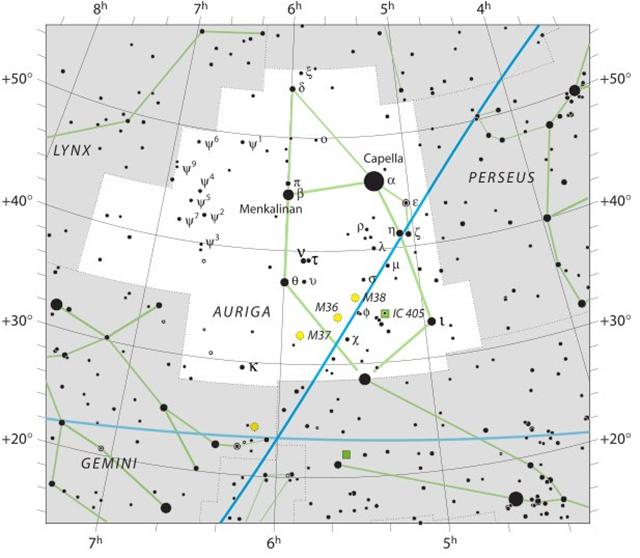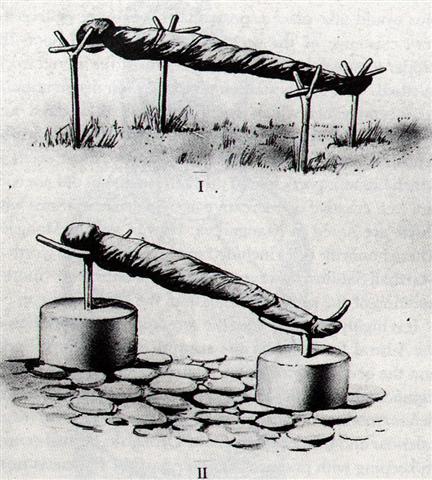Bb9.2
Menkaure had been given only 6 days to live. We can count
(hia) from
Bb8-35 to Ba8-41:
 |
 |
|
Bb8-33 |
Bb8-34 (318) |
|
ko te
rima kua hakamata ia ki
te kupega |
e
tagata oo - ki te purega
e |
|
Kupega. He-tá i te
kupega, to weave (a
net). Hopu kupega,
those who help the
motuha o te hopu kupega
in handling the fishing
nets. Huki kupega,
pole attached to the
poop from which the
fishing-net is
suspended. Mata
kupega, mesh. Te
matu'a o te kupega,
part of a net from which
the weaving started.
Te puapua kupega,
the upper part of a
fishing net. Tau
kupega, rope from
which is hung the oval
net used in ature
fishing. Tuku kupega,
a fishing technique:
two men drag along the
top of a fishing net
doubled up, spread out
on the bottom of a small
cove, trapping the fish
into the net. Vanaga.
Pure. Cowrie
(Cypraea caput
draconis); pure
vaka, another type
of cowrie, which can
float on the sea like a
diminutive boat (vaka).
Vanaga. 1. To pray, to
supplicate, invocation,
prayer; hare pure,
church, chapel; tae
pure, irreverence;
purega, prayer P
Pau., Mgv., Mq., Ta.:
pure, to pray. In
Samoa, Tonga, Niuē,
Futuna, Uvea,
pule
means to command.
2. A shell T. P Pau.:
hakapurepure, to
dye, to color. Mq.:
pué, the porcelain
shell. Ta.: pure,
a mark. Purepure,
spotted, dappled;
ragi purepure,
dappled sky.
Purepurea, spotted.
P Pau.: hakapurepure,
to dye, to color. Mgv.:
purepure, printed
cloth; akapurepure,
to paint in different
colors. Mq.: puépué,
covered with pale scars.
Ta.: purepure,
spotted, dappled.
Churchill.
Pureva,
rock, stone (small
enough to be thrown by
hand). Vanaga.
Pureva, to
throw a stone. Ta.:
Pureva, to
be on the eve of going.
Ha.:
puleva, to
float here and there.
Churchill. Pau.:
Pure-hiva, a
butterfly. Mgv.:
pure-rehue, id. Ta.:
pure-hua, a moth.
Mq.: pure-hua,
id. Ma.: pure-hua,
id. Churchill. |
|
Dec 10 (*81 + 183 =
*264) |
11
(345) |
|
RIGHT ASCENSION DAYS AT
THE FULL MOON: |
|
KHUFU
MINTAKA (Belt) = δ
Orionis,
υ Orionis (82.4),
χ Aurigae (82.5), ε
Columbae (82.6)
*41.0 = *82.4 - *41.4
→ 41 Arietis (Bharani) |
KHAFRE
Al
Hak'ah-3 (Brand)
/
Mrigashīrsha-5 (Stag's
Head)
/
Turtle Head-20 (Monkey)
/
Mas-tab-ba-tur-tur
(Little Twins)
ARNEB =
α
Leporis, CRAB NEBULA =
M1 Tauri
(83.0,
φ¹
Orionis (83.1),
HEKA =
λ
Orionis,
ORION NEBULA = M42
(83.2),
φ²
Orionis (83.6),
ALNILAM (String of
Pearls) =
ε
Orionis
(83.7) |

 |
 |
|
Bb8-35 (740) |
Bb8-36 (320) |
|
kua
vere koia ki te ohoga |
o te
vae |
|
MENKAURE
Three Stars-21 (Gibbon)
/
Shur-narkabti-sha-shūtū-6
(Star in the Bull
towards the south)
/
ANA-IVA-9 (Pillar of
exit)
HEAVENLY GATE =
ζ
Tauri,
ν
Columbae (84.0),
ω
Orionis (84.2),
ALNITAK (Girdle) =
ζ
Orionis,
PHAKT (Phaet) =
α
Columbae
(84.7) |
ο Aurigae (85.8), γ Leporis (85.9)
YANG MUN (α Lupi) |
|
... An oracle reached
him from the town of
Buto, which said
'six years only shalt
thou live upon this
earth, and in the
seventh thou shalt end
thy days'.
Mycerinus,
indignant, sent an angry
message to the oracle,
reproaching the god with
his injustice - 'My
father and uncle,' he
said 'though they shut
up the temples, took no
thought of the gods and
destroyed multitudes of
men, nevertheless
enjoyed a long life; I,
who am pious, am to die
soon!' There came in
reply a second message
from the oracle - 'for
this very reason is thy
life brought so quickly
to a close - thou hast
not done as it behoved
thee ... |
 |
 |
 |
|
Bb8-37 (321) |
Bb8-38
→ 83 * 8 =
664 |
Bb8-39 |
|
mai tae topa te Raa |
ki to ua |
ai ka topa te Raa |
|
μ Columbae (86.1),
Saiph (86.5), ζ μ
Columbae,
SAIPH (Sword) = κ
Orionis
(86.5), τ Aurigae, ζ
Leporis (86.6) |
υ Aurigae (87.1), ν
Aurigae (87.2),
WEZN (Weight) = β
Columbae,
δ Leporis (87.7),
TZE (Son) = λ
Columbae
(87.9) |
Ardra-6 (The Moist
One) /
ANA-VARU-8 (Pillar
to sit by)
χ¹
Orionis,
ξ
Aurigae (88.1),
BETELGEUZE =
α
Orionis
(88.3),
ξ
Columbae (88.5),
σ
Columbae (88.7)
ZUBEN ELGENUBI (α
Librae) |
|
Topa. 1.
To bend down, to
drop to the ground;
to fall on a certain
date. 2. To stop
doing something, to
drop; ina ekó
topa taau aga,
do not stop, keep
doing your work. 3.
To remain, to be
left over, to be
unfinished; he
topa te kai, the
food is not
finished, there is
some left. 4. To
come to one's
memory; i te aamu
he topa te vânaga
tûai, in the
legends old words
come to memory. 5.
To remember, to
reflect (with
mana'u as
subject); e-topa
rivariva tokorua
mana'u ki te me'e
nei, let the two
of you think
carefully about this
thing. Vanaga. 1.
Wine; topa tahaga,
id. 2. To fall in
drops, to descend,
to go down, to
abdicate; topa
iho, to fall;
hakatopa, to
knock down, to cause
to fall; hakatopa
ki raro, to
knock down, to
subjugate. 3.
Childbirth,
abortion; topa te
poki, to lie in.
4. A feast, to
feast. 5. To arrive,
to result; topa
rae, newcome;
topa iho, to
come unexpectedly;
topa ke, to
deviate; topa no
mai, topa
hakanaa, topa
tahaga, mau
topa pu,
unexpected; topa
okotahi,
solitary;
hakatotopa, to
excite, to foment.
6. Bad, low, cheap,
failure; igoa
topa, nickname;
ariga topa,
sinister, sly,
ill-tempered, to
hang the head;
hakatopa, to
disparage;
hakatotopa,
irresolute. 7. (Of
upward movement)
topa ki raro, to
scale, to surpass;
hakatopa ki te ao,
to confer a dignity;
hakatopa ki te
kahu, to spread
a sail;
hakatotopa, to
make a genealogy.
Churchill.

Raa.
Sun; day; i te
raá nei, today;
raá îka, good
day for fishing.
Vanaga. 1. Sun. 2.
Day. 3. Time. 4.
Name of sub-tribe.
Fischer.
Te manu i te raá
= comet.
Barthel.
'... The
substitution of the
sun for the sail,
both of which are
called ra or
raa in
Polynesia, is a
remarkable feature
in Easter Island art
... ' Heyerdahl 3.
1. The sun;
raa ea mai,
raa puneki,
sunrise;
raa tini,
raa toa,
noon. P Mgv., Ta.:
ra,
the sun. Mq.:
a, id.
2. Day, date;
a raa nei a,
to-day, now;
raa i mua,
day before. P Mgv.,
Ta.:
ra, a
day. Mq.:
a, id.
Churchill.
'... The chief thus
makes his appearance
at Lakeba
from the sea, as a
stranger to the
land. Disembarking
at the capital
village of Tubou,
he is led first to
the chiefly house (vale
levu) and next
day to the central
ceremonial ground (raaraa)
of the island ...'
(Islands of History)
Ta.:
toraaraa,
to raise up.
Churchill 2. |
 |
 |
 |
 |
|
Bb8-40 (324) |
Bb8-41 |
Bb8-42 |
|
i
te hokohuki - ka hua
ia |
mai tae atu ki te
tagata - hupee
hia |
ka tuu i te toga |
|
η
Leporis (89.0),
PRAJA-PĀTI (Lord of
Created Beings) =
δ
Aurigae,
MENKALINAN (Shoulder
of the Rein-holder)
=
β
Aurigae, MAHASHIM
(Wrist) =
θ
Aurigae,
and
γ
Columbae (89.3),
π
Aurigae (89.4),
η
Columbae (89.7)
*48.0 = *89.4 -
*41.4 |
μ Orionis (90.3), χ²
Orionis (90.5) |
6h (91.3)
ν
Orionis (91.4),
θ
Columbae (91.5),
π
Columbae (91.6)
*50.0 = *91.4 -
*41.4 |
|
Hoko. 1. To
jump; to rock
or swing in
rhythm with the
chants in festivals,
as was the ancient
custom; an ancient
dance. He to'o mai e te hoa manu i te mamari ki toona rima, he
ma'u, he hoko,
the 'bird master'
receives the egg in
his hand and carries
it, dancing. 2.
Number prefix: 'in a
group of...':
hokotahi,
alone; hokorua, in a group of two (also companion, e
hakarere te kai mo
toou hokorua,
leave some food for
my companion);
hakatoru, in a
group of three,
etc.; hokohía,
in a group of how
many? Hokohía ana
oho koe ki te rano?
With how many people
will you go to the
volcano? Vanaga. 1.
To traffic, to
trade, to buy, to
ransom (hoò);
hoòa te kaiga,
to buy land. 2. To
sport, to play.
Churchill. Move the
body to and fro with
the rythm of a song.
Barthel.
Ka. Particle
of the affirmative
imperative, of
cardinal numerals,
of independent
ordinal numerals,
and of emphatic
exclamation, e.g.
ka-maitaki! how
nice! Vanaga. Ká.
1. To light a fire
in order to cook in
the earth oven (see
umu):
he-ká i te umu,
he-ká i te kai.
2. Figuratively: to
fire up the soul. To
put oneself in a
fury (with manava):
ku-ká-á toona manava
he has become
furious. Vanaga. 1.
Of T. 2. Imperative
sign; ka oho,
ka tere,
ka ea, begone!;
ka ko iha, a
greeting T; ka
mou, hush; ka
oho, goodbye. 3.
Infinitive sign;
mea meitaki ka rava,
a thing good to
take; ka harai
kia mea, to
accompany. 4. A
prefix which forms
ordinals from
cardinals. 5. The
dawning of the day.
6. Different (?
ke). Churchill.
Hupee.
Mucus; hupeehupee,
asthma. T Pau., Ta.:
hupe, mucus.
Churchill. Ta.:
Hupe, mucus.
(Sa.: isupē,
id.) Ma.:
hupe,
id. Churchill.
Rhume, air
froide. Jaussen
according to
Barthel. |
In the G text Bb8-41 should correspond to
Ga1-26 and
Ga1-20 to Bb8-35:
|




















